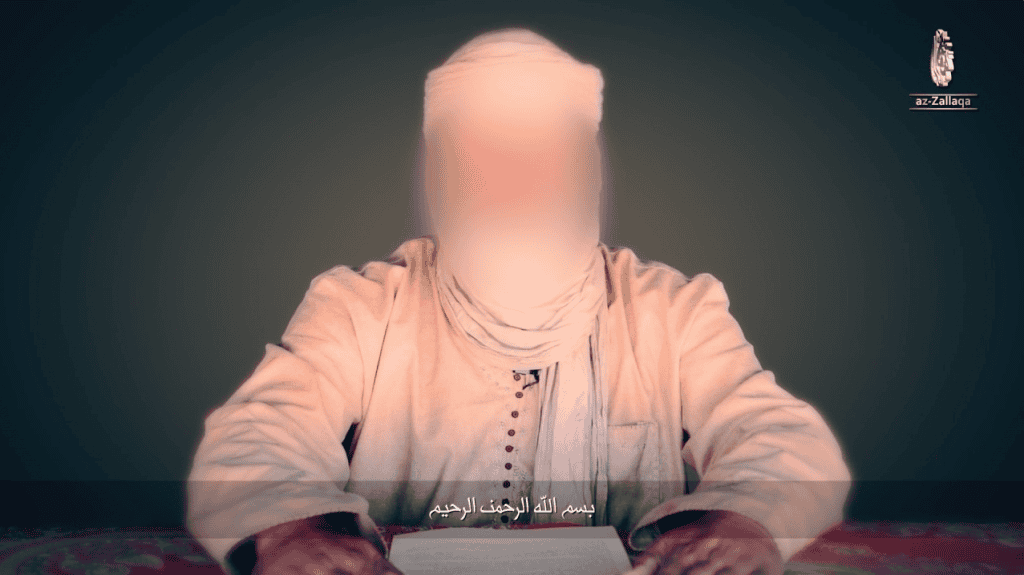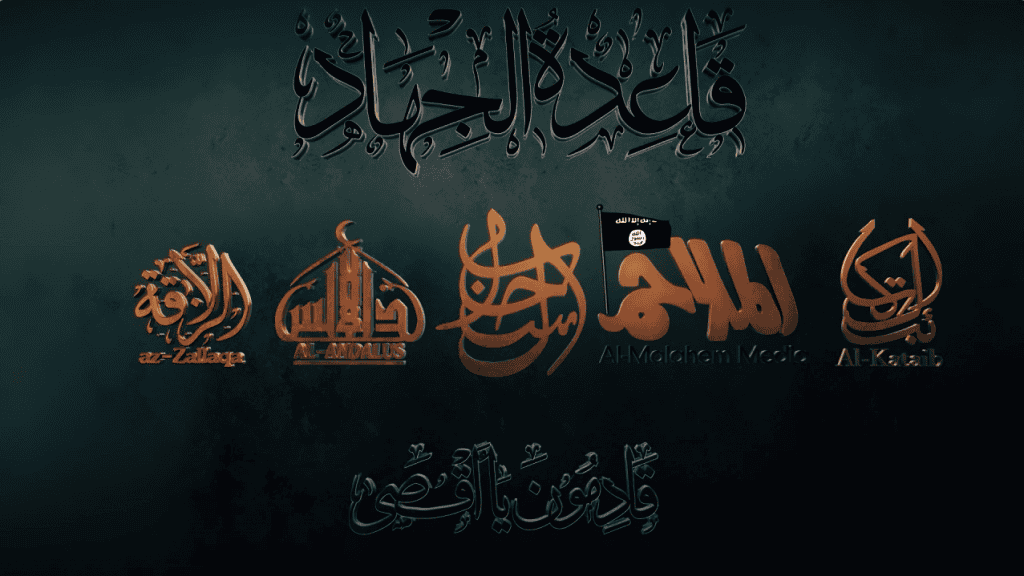
Al Qaeda’s branch in Mali and West Africa, Jama’at Nusrat al-Islam wal-Muslimin (JNIM, or the “Group for the Support of Islam and Muslims”), has released a new video addressing the families of several of its hostages. For years, JNIM and related al Qaeda groups have released updates concerning the captives’ status, showing they are alive and demanding payment for their release.
But according to an English-speaking jihadist whose face is obscured, JNIM has decided “to discontinue the release and production of videos concerning the captives held by the group for undisclosed reasons.”
The entire production, which is over 10 minutes long, is intended to pressure the hostages’ home governments into acting.
The video was produced by JNIM’s media arm, Az-Zallaqa, and its unit responsible for handling hostage-related messages, Al-Ezza Production.
An image at the beginning of the production (seen below) ties Az-Zallaqa to the media arms of three other al Qaeda branches: Al Qaeda in the Islamic Maghreb (Al-Andalus Media), Al Qaeda in the Arabian Peninsula (Al-Malahem Media), and Shabaab in Somalia (Al-Kataib Media).

Much of the message is focused on France, which JNIM blames for failing to negotiate the release of Sophie Petronin, a French humanitarian who was kidnapped in the city of Gao on Dec. 24, 2016. Al Qaeda’s men have agitated to secure a ransom for Petronin’s release on multiple occasions in the past.
The group now claims that the French government has “complete disregard” for her case, pointing to France’s recent commemoration of the 100-year anniversary of the end of the First World War in November. JNIM says this has occupied the French government’s attention, even though the French press has covered Petronin’s captivity in recent weeks. The video even includes a reference to French President Emmanuel Macron’s tense relationship with President Donald Trump, with on-screen text saying Macron “received a number of slaps to the face from his counterpart Trump!”
JNIM alleges “the French government is impeding the dossiers of all captives held by the group and specifically Sophie’s dossier,” adding that this is a “bitter truth that her family must acknowledge.”
The English-speaking spokesman for the organization directly addresses Sophie’s son, Sebastien, apologizing to him for his inability to visit with his mother and blaming France. JNIM’s front man praises Sebastien’s handling of the matter, while calling on him to embrace Islam. The JNIM speaker also discusses the cases of several other hostages: Iulian Ghergut (Romanian), Ken Elliott (Australian), Beatrice Stockly (Swiss), and Gloria Navarez (Columbian). JNIM has featured each of their cases in previous videos and messages. [See FDD’s Long War Journal reports: Al Qaeda video shows its hostages in northern Mali and JNIM releases proof-of-life video for French hostage.]
“The leadership of JNIM also conveys to the families of the captives that the mujahideen are not responsible for the delay in resolving the release of the captives, but in fact it is the French government (i.e. the occupying state)who is directly responsible for impeding negotiations,” the JNIM spokesman says. “Subsequently, the governments of the captives in question are also impeding negotiations to a certain extent.”
The jihadist on camera addresses Stockly’s brother, criticizing him for his handling of the matter and saying that JNIM doesn’t need any lectures on Islam.He even goes so far as to blame Beatrice Stockly for her own captivity. The JNIM man says Stockly was captured in 2012 and then released with the understanding that she wouldn’t return to missionary work in the area. When Stockly returned, she was abducted once again, with the jihadists arguing that she broke their agreement.
The on-camera jihadist adds that Stockly’s brother should contact former JNIM hostages in order to use “appropriate channels” for negotiations, as none of the captives’ home governments are cooperating. The JNIM man calls on all of the hostages’ families to embraceIslam.
Hostage-taking has been a profitable business for al Qaeda in Africa. AQIM has received multiple ransom payments, totaling millions of dollars.
In the past, Al Qaeda’s senior leadership has assumed control of some hostage negotiations. Osama bin Laden wanted to use hostages as a bargaining chip to force France’s exit from the war in Afghanistan. Files recovered in bin Laden’s Abbottabad, Pakistan compound contained reports on the ransoms received and AQIM’s other activities throughout the region. [For more, see FDD’s Long War Journal report, Analysis: Al Qaeda central tightened control over hostage operations.]







